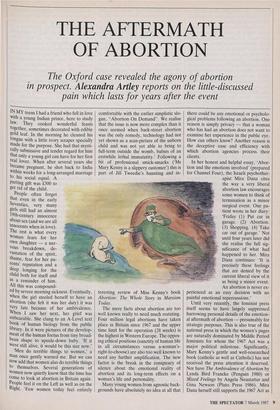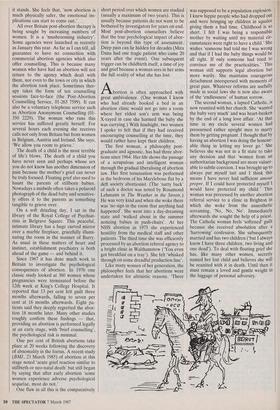THE AFTERMATH OF ABORTION
The Oxford case revealed the agony of abortion pain which lasts for years after the event
IN MY teens I had a friend who fell in love with a young Indian prince, here to study law. They cooked wonderful feasts together, sometimes decorated with edible gold leaf. In the morning he cleaned his tongue with a little ivory scraper specially made for the purpose. She had that mysti- cally submissive and tender regard for him that only a young girl can have for her first real lover. When after several years she became pregnant, he shot back to India within weeks for a long-arranged marriage to his social equal. A parting gift was £300 to get rid of the child.
`Men do terrible things to women,' a man once gently warned me. But we can now add that women also do terrible things to themselves. Several generations of women now quietly know that the time has come to look at abortion in Britain again. People feel it on the Left as well as on the Right. 'Few women today feel entirely comfortable with the earlier simplistic slo- gan, "Abortion On Demand". We realise that the issue is now more complex than it once seemed when back-street abortion was the only remedy, technology had not yet shown us a scan-picture of the unborn child and was not yet able to bring to full-term outside the womb, babies of an erstwhile lethal immaturity.' Following a bit of professional smick-smacks (`Ms Mary Kenny is a slippery customer') this is part of Jill Tweedie's haunting and in- teresting review of Miss Kenny's book Abortion: The Whole Story in Marxism Today.
The mere facts about abortion are too well known really to need much restating. Four million legal abortions have taken place in Britain since 1967 and the upper time limit for the operation (28 weeks) is the highest in Western Europe. The oppos- ing ethical positions (sanctity of human life in all circumstances versus a-woman's- right-to-choose) are also too well known to need any further amplification. The new factor is the break in the conspiracy of silence about the emotional reality of abortion and its long-term effects on a woman's life and personality.
Many young women from agnostic back- grounds have absolutely no idea at all that there could be any emotional or psycholo- gical problems following an abortion. One reason is simply privacy — that a woman who has had an abortion does not want to examine her experience in the public eye. How can others know? Another reason is the deceptive ease and efficiency with which abortion agencies process their clients.
Until very recently, the feminist press itself seems to have largely suppressed harrowing personal details of the emotion- al aftermath of abortion — presumably for strategic purposes. This is also true of the national press in which the women's pages are naturally dominated by Middle Period feminists for whom the 1967 Act was a major political milestone. Significantly, Mary Kenny's gentle and well-researched book (catholic as well as Catholic) has not received the press attention it deserved. Nor have The Ambivalence of Abortion by Lynda Bird Francke (Penguin 1980) or Mixed Feelings by Angela Neustatter and Gina Newson (Pluto Press 1986). Mira Dana herself still supports the 1967 Act as it stands. She feels that, 'now abortion is much physically safer, the emotional im- plications can start to come out.'
All over Britain post-abortion therapy is being sought by increasing numbers of women. It is a 'mushrooming industry'. Some agencies were launched as recently as January this year. As far as I can tell, all guarantee to have no connection with commercial abortion agencies which also offer counselling. This is because many women who have had an abortion will not return to the agency which dealt with them, nor even to the town or city in which the abortion took place. Sometimes ther- apy takes the form of ten counselling sessions face-to-face (the Post-Abortion Counselling Service, 01-263 7599). It can also be a voluntary telephone service such as Abortion Anonymous Counselling (01- 350 2229). The woman who runs this service has suffered greatly herself. For several hours each evening she receives calls not only from Britain but from women in Belgium, Austria and Ireland. She says, `We allow you room to grieve.'
The death of a child is the most terrible of life's blows. The death of a child you have never seen and perhaps whose sex you do not know has another dimension of pain because the mother's grief can never be truly focused. Floating grief also used to haunt the parents of stillborn babies. Nowadays a midwife often takes a polaroid photograph of the dead baby and sensitive- ly offers it to the parents as something tangible to grieve over.
On a soft drizzling day, I sat in the library of the Royal College of Psychiat- rists in Belgrave Square. This peaceful, intimate library has a huge curved mirror over a marble fireplace, gracefully illumi- nating the room in the manner of Barry. As usual in these matters of heart and instinct, establishment psychiatry is both ahead of the game — and behind it.
Since 1967 it has done much work in Britain to investigate the psychological consequences of abortion. In 1976 one classic study looked at 360 women whose pregnancies were terminated before the 12th week at King's College Hospital. It reported that 13 per cent felt guilt three months afterwards, falling to seven per cent at 18 months afterwards. Eight pa- tients said they deeply regretted the abor- tion 18 months later. Many other studies roughly confirm these findings — that, providing an abortion is performed legally at an early stage, with 'brief counselling', the psychological risk is minimal.
One per cent of British abortions take place at 20 weeks following the discovery of abnomality in the foetus. A recent study (BMJ, 23 March 1985) of abortion at this stage noted 'acute grief reaction similar to stillbirth or neo-natal death' but still began by saying that after early abortion 'some women experience adverse psychological sequelae, most do not.'
One flaw in all this is the comparatively short period over which women are studied (usually a maximum of two years). This is usually because patients do not want to be bothered by investigators for years on end. Most post-abortion counsellors believe that the true psychological impact of abor- tion is beyond this type of assessment. Deep pain can lie hidden for decades (Mira Dana had one tragic patient who came 20 years after the event). One subsequent trigger can be childbirth itself, a time of joy and grief because a woman sees in her arms the full reality of what she has lost.
Abortion is often approached with great ambivalence. (One woman I know who had already booked a bed in an abortion clinic would not go into a room where her eldest son's arm was being X-rayed in case she harmed the baby she was carrying.) With hindsight, two women I spoke to felt that if they had received encouraging counselling at the time, they would rather have kept their children.
The first woman, a philosophy post- graduate and agnostic, has had three abor- tions since 1964. Her life shows the passage of a scrupulous and intelligent woman . through the gradual liberalising of abortion law. Her first termination was performed in the bedroom of his Marylebone flat by a deft society abortionist. (The 'natty back' of such a doctor was noted by Rosamond Lehmann in The Weather in the Streets.) He was very kind and when she woke there was 'no sign in the room that anything had happened'. She went into a day-dreaming state and 'walked about in the summer noticing babies in push-chairs'. At her NHS abortion in 1975 she experienced hostility from the medical staff and other patients. The third time she was efficiently processed by an abortion referral agency to a bright clinic in Walthamstow (`You even got breakfast on a tray'). She felt 'whisked through on some dreadful production line'.
Like many women of her generation, the philosopher feels that her abortions were undertaken for altfuistic reasons. 'There was supposed to be a population explosion. I knew hippie people who had dropped out and were bringing up children in squalor giving them a bad time. Childhood is so short. I felt I was being a responsible mother by waiting until my material cir- cumstances were right to have a child.' She wishes 'someone had told me I was wrong and that if I had the baby things would be all right. If only someone had tried to convince me of the practicalities.' This woman still supports legal abortion but more warily. She maintains courageous detachment interspersed with moments of great pain. Whatever reforms are usefully made in social laws she is now also aware of the 'endlessness' of human sorrow.
The second woman, a lapsed Catholic, is now reunited with her church. She 'wanted the baby very much' and was heart-broken by the end of a long love affair. 'At that time in my circle several women had pressurised rather upright men to marry them by getting pregnant. I thought that by having an abortion I was doing the honour- able thing in letting my lover go.' She believes she was not in a fit state to take any decision and that 'women from an authoritarian background are more vulner- able to subtle coercion. I was brought up to always put myself last and I think this means I have never had sufficient amour propre. If I could have protected myself I would have protected my child.' This woman was processed by another abortion referral service to a clinic in Brighton in which she woke from the anaesthetic screaming, 'No, No, No'. Immediately afterwards she sought the help of a priest. The Catholic woman feels 'softened' guilt because she received absolution after a `harrowing' confession. She subsequently married and has two children (tut I always know I have three children, two living and one dead'). To deal with floating grief she has, like many other women, secretly named her lost child and believes she will be reunited with it in death. Until then it must remain a loved and gentle weight in the luggage of personal adversity.



























































 Previous page
Previous page